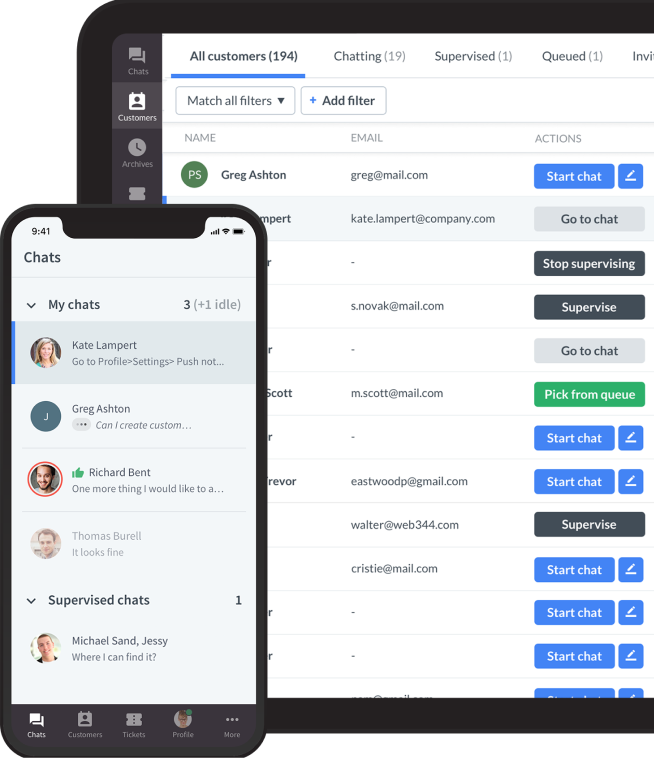Showing top 0 results 0 results found
Showing top 0 results 0 results found

Here’s a quick and simple guide for live chat operators and website visitors who discuss sales and support matters over the chat - live chat etiquette.
Although some of the tips below might seem obvious, the communication goes much better if goals of the chat operator overlap with those of the customer.
How to help through a chat session? The operator’s view
The main goal is to help the customer. Assistance might be needed with various things: placing an order; setting up, fixing or replacing a product, scheduling an appointment, etc.
Something extra to gain here is customer satisfaction. Lightning quick service with friendly approach, sense of humor and a little surprise (like upgrade on delivery, discount for future orders, better deal) will turn the chat into a memorable experience and will make the customer a lifelong fan of your brand.

At the same time - slow service and negative attitude combined with multiple transfers between agents are the best way to lose the customer forever.
Here are my suggestions for the three main areas of live chat etiquette that should be covered to create the perfect experience for a clients serviced by live chat customer service teams.
Knowledge tips
- Know the offer - be certain of what you are saying about the product or service. Well trained and knowledgeable staff is a good way to impress people.
- Know your resources - it’s also part of good customer service training to know where to send people asking for detailed product specifics or particular section of the website. It will work especially well with comprehensive base of links and canned responses.
Behaviour tips
- Focus on solving the issue - although sometimes a general chit-chat might be appreciated, especially with a returning customer, try not to go off-topic too much. ‘Let’s get back to business’ usually helps with bringing the visitor back to the right subject.
- Leave your attitude at the door - restrain from comments and own opinions, keep the sarcasm for yourself. Instead of inflaming the situation, try to calm down the angry person on the other side.
- Listen patiently - allow customer to explain the issue in details. Understanding where lies the actual problem is the quickest path to the solution.
- Be cheerful and polite - well, it’s not only about solving the issue, but also about the way it’s done. Try to put a smile on customer’s face.
- Don’t lie - the obvious one, huh? If you promise something (like free delivery), keep that promise and spare the future disappointment (‘I need to pay for that?!’). The worst truth is better than the sweetest lie.
- Be clear - reply yes/no and elaborate on that, do not simply use one or the other.
- Don’t be afraid of transferring the chats - don’t ask for permission when you need to make a transfer. However, you need to make sure to inform the customer that all chat details are being transferred to another rep. Customers hate repeating themselves.
Extra tips
- for sales teams: use language of benefit, pitch only when asked to, highlight benefits of changing the status quo, be informative and proactive.
- for support teams: use simple answers and be honest when there's a need to move up a tier, try to understand what exactly doesn't work from "it doesn't work" phrase, assist in answering questions if the customer is not tech savvy.
Technical tips
- Use precise and simple questions - it will allow you to quickly locate the issue and deal with it.
- Avoid jargon - customers may not know any specific terminology, so you have to make sure you are understood.
- Avoid typos and use proper spelling - valuable chat solutions offer dictionaries, it’s a good idea to make use of them.
- Describe your actions - inform about checking on more information, use phrases like ‘please hold on’, ‘allow me to check that’, ‘let me get that information for you’.
- Never leave the customer unanswered - confirm that you read the question and that the reply is being prepared.
- Make use of canned responses - people expect valuable answers in real-time. Properly prepared canned responses make work more efficient and allow to handle several chat sessions at once with quality remaining on a high level.
- Use real photo and real name - this creates a better relation between a customer and the operator, as well as builds a trust between both parties.
- Make use of remote desktop tool - it’s especially useful in troubleshooting software issues, because nothing helps as much as seeing customer’s desktop.
- Try to solve the issue in one contact - the best way to win hearts of your customers is to close their cases during one chat, without having them have to come back several times and go over the same questions again.
Wow your customers
Once you take care of general practices that allow you to create good customer service, your base is ready and it is time to take a step forward and work on customer amazement.
Doing something memorable, something crazy that positively surprises people you chat with not only makes them happy, but also turns them into brand ambassadors. Simply said: positive experience makes people talk.
The natural extension will be measuring the results and constant work on their improvements. Here's the infographic that will give you an idea of what to focus on:

How to get my problem solved? The customer’s view
The main goal of the customer is to have the issue solved. Most of them are sure how to behave to make it easier for the operator to get problems solved.
Knowledge tips
- Get the information ready - any information that might be useful should be collected before entering the chat - this way the operator will be able to help quicker.
Behaviour tips
- Read what the operator says - follow the instructions.
- Don't be afraid to ask again - if you don't understand something, ask for clarification.
- Keep your emotions down - it’s probably the hardest part, because the encountered problem is usually something that brought the customer to the website and had him start the chat. Caps and exclamation signs make it hard to read the text. Don’t try to make the operator get mad as well.
- Be patient - some issues are more complex and require a bit more time. Some operators lack certain skills or system access - don’t go mad if they transfer you to a higher tier.
- Appreciate help - it’s nice for the customer service rep to see his work is commented positively and appreciated. Thank for help if the solution was correct - it won’t cost you much, while it might give a boost to the agent.
Technical tips
- Provide your real name and email address - this way it’s easier for the operator do follow up.
- Do not use caps lock - typing entire word with capital letters means screaming. No one likes to be shouted at (using caps means you are screaming).
- Answer questions in your own words - don’t worry about the terminology, elaborate when asked to.
- Explain the problem in details - provide as many details as possible. Give the operator time to understand your issue. He's far away and can't see what you see.
- Allow use of remote desktop tool - if asked, let the operator preview your screen, it will be easier to troubleshoot.
- Rate the help you were offered - fill the surveys after chats and honestly rate the operators. They are being paid based on the quality they offer.
Don’t make it hard for the other side
A thing to remember is that text lacks feelings without context, which makes chat more advantageous than a phone, as it does not pass the emotions as easily as voice. On the other hand, it might be a reason for misunderstandings between people located in different locations and conducting a chat, when emotions are not clearly expressed by words. The point is to get on the same page, understand the positions of the person on the other side and to work together on getting things done.
As you can see, live chat etiquette isn't that hard.
How is chat working out for you?
Chat support can be quantified similarly to the help offered by call centers. There's a handful of measures that describe the value of live chat implementation and reflect customer satisfaction.
Take a look at live chat best practices based on data gathered from over 600 companies and 1.76 mln chats. Compare the results in your business with other companies in your industry.








Comments